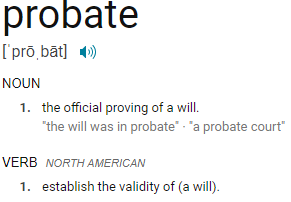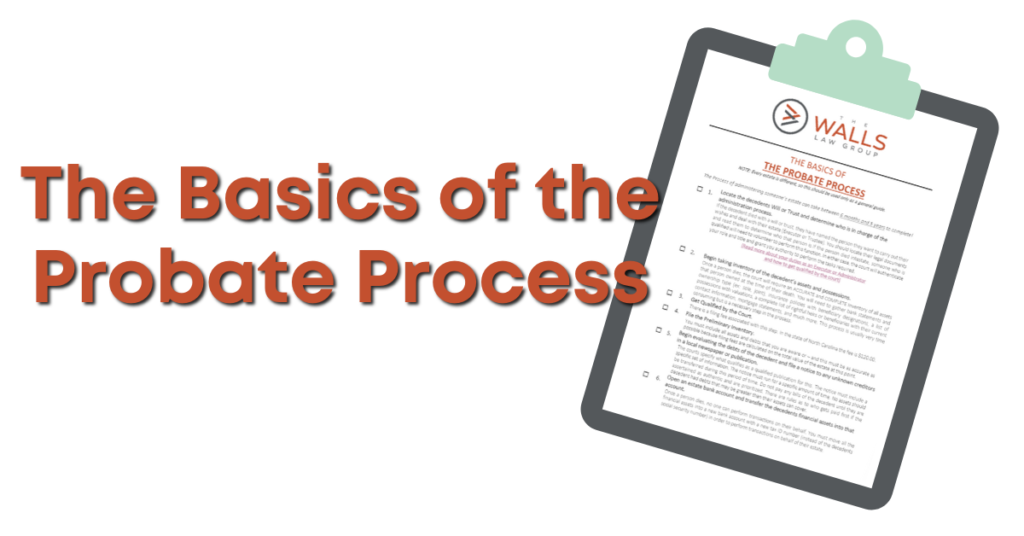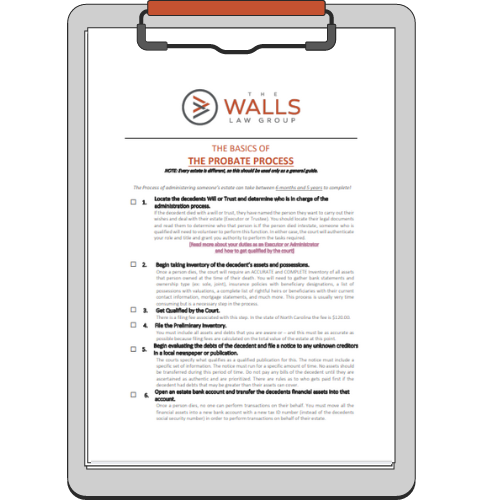
![]()
PROBATE
Trust and Estate Administration
“If Estate Planning is the process of designing a playbook, probate (also known as estate administration) occurs when the playbook is put into action.

Check out our PROBATE CHECKLIST below! ![]()
THE PROBATE PROCESS
Probate (AKA Estate or Trust Administration) can be triggered by someone’s death or incapacity.
Upon your death or incapacity, the individual(s) you named in your estate planning documents must now step into action and execute the plan you set up.
If you did not make a will before you died (or became incapacitated), your belongings and any assets you owned will be distributed using the intestacy laws in your state (more on that below).
The probate process can be quite complex, so the Executor should generally obtain experienced legal counsel to guide them through the process.
Your Personal Representative, or Executor – the person you named in your will to carry on your wishes (an “Administrator” if you didn’t make a will), will be tasked with making many important decisions – sometimes quickly – and they may need help making them wisely.
It’s highly recommended that this person should have experienced legal counsel because they will be held legally accountable for their actions (or lack of action) in the eyes of the law.
The probate process involves preparing accurate inventories of your property, preparing tax returns, and signing other important documents on your behalf.
Ultimately, your Executor must divide and distribute your property to those individuals (or charities) you identified in your will or trust agreement. Those distributions will be accounted for on Inventories and Accountings submitted to the court for processing and must match and balance to the penny.
If your family has experienced the loss of a loved one, we can help you navigate the process of probating of their estate.
Having a carefully crafted estate plan is a critical component of maintaining your family’s financial and emotional stability, however, if your loved one did not make a plan before their death, we can help.
It’s never easy and we are here to help get you through it.
Our firm’s guiding principle is to provide every family we represent with the highest quality probate & trust administration service available.
PROBATE & INTESTACY (dying without a will)
Probate is the process by which the courts (a probate judge) will authenticate the will of the deceased, appoints the Executor as specified in the will (if that person qualifies under the law) and then oversees the process of distributing their assets to the rightful owner(s). If the person died without a will, the legal term is dying “intestate.” If a person dies intestate, the court will appoint an Administrator (usually a family member or close friends) to distribute the deceased’s personal belongings (bank accounts, real estate, household goods, jewelry, and other assets) according to the requirements of North Carolina probate law.
THE BASICS OF THE PROBATE PROCESS
The Process of administering (or “probating”) an estate can take from as little as 6 months to 5 years to complete!
Please note: each estate is different, so this is just a general guide.
- Locate the decedents Will or Trust and determine who is in charge of the administration process.
- Begin taking inventory of the decedent's assets and possessions.
- Get Qualified by the Court.
- File the Preliminary Inventory.
- Begin evaluating the debts of the decedent and file a notice to any unknown creditors in a local newspaper or publication.
- Open an estate bank account and transfer the decedents financial assets into that account.
- Notify Heirs and Beneficiaries.
- Transfer ownership of assets to their rightful owners.
- Sell any assets that were either directed to be sold by the decedent or are needed to pay creditors.
- File one or more accountings with accurate receipts and documentation
- Distribute all remaining assets and pay all outstanding creditors
- Close the estate
IMPORTANT NOTE
You should NEVER re-title any assets before speaking with a qualified estate planning attorney.
We know it is difficult to deal with a loved one’s passing.
Our staff is friendly and compassionate and can help you start the process.
You can reach our office at 919-647-9599 to speak with one of our staff members, or email us with the form below with any questions that you may have and to arrange a consultation.
RELATED RESOURCES:

Watch our Staff on Probate Weekly!
April 26, 2022: Attorney Jason Walls discusses the importance of having an Estate Plan to avoid Probate with host Bill Gross of Probate Weekly
April 18, 2022: Paralegal Ashley Palmer discusses Probate and Estate Administration in North Carolina with host Bill Gross of Probate Weekly









